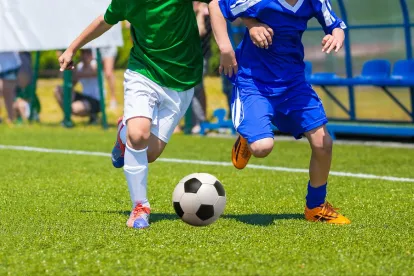Sunday saw one of the most anticipated games of the 19/20 Premier League season as Liverpool FC hosted Manchester City at Anfield. Liverpool came away with the three points, however the victory was not without controversy. There were a number of decisions, which left Manchester City fans feeling aggrieved and the general football community becoming increasingly frustrated, and confused, with VAR and the new handball rule.
After careful consideration of the law, it appears that the reason for the confusion stems from Premier League Guidance, which on its face contradicts The International Football Association Board’s (IFAB) Laws of the Game. The Laws of the game suggest that it should have been a penalty to Manchester City, albeit some discretion is reserved for the referee. The Premier League Guidance suggests that no penalty should have been awarded consequent upon the deflection from a player close by (and not by virtue of any alleged prior handball).
What happened?
In the first half of the game, at 0-0, Manchester City had possession in the Liverpool penalty box. Dejan Lovren attempted to clear the ball, which hit Bernardo Silva’s hand and deflected onto Alexander-Arnold’s arm. The referee, and VAR, dismissed cries for a penalty and Liverpool scored the opening goal of the game on a counter attack resulting from this play.
Since Sunday, discussions about the match have been dominated by a debate as to whether the referee should have awarded a penalty against Alexander-Arnold for handball. In a post-match interview, Alexander-Arnold s said “[i]t has hit my arm but I think it hit Bernardo’s first”.
IFAB determines the laws of the game, which are the same for all football throughout the world from the FIFA World Cup to the Hackney Marshes. Indeed, Article 7(1) of the FIFA Statutes requires each member association to “play association football in compliance with the Laws of the Game issued by The IFAB”. Law 12 for the 2019/20 season relates to fouls and misconduct, including handballs.
There are three issues to consider here: (i) Bernardo Silva’s handling of the ball, (ii) Alexander-Arnold’s handling of the ball, and (iii) how the Premier League Guidance confuses matters.
(i) Did Bernardo Silva’s handling of the ball constitute an offence, and thus a free kick?
The second bullet point of the ‘Handling the ball’ section in Law 12 governs handball offences made by attacking players which carry a kind of strict liability:
It is an offence if a player:
- “Deliberately touches the ball with their hand/arm, including moving the hand/arm towards the ball;
- Gains possession/control of the ball after it has touched their hand/arm and then:
- scores in the opponent’s goal;
- creates a goal-scoring opportunity;
- scores in the opponents’ goal directly from their hand/arm, even if accidental, including by the goalkeeper.”
On this basis, it cannot be said that Bernardo Silva’s handling of the ball constitutes an offence. Silva did not deliberately handle the ball – it hit his hand (which was by his side, in a natural position) as a result of Lovren’s attempted clearance. Silva did not gain possession or control of the ball after it touched his hand either.
Even if the ball had hit Silva’s hand and Sterling scored as a result, without the ball ever touching Alexander-Arnold, it is difficult to justify it as an offence as he never gains possession of the ball.
(ii) Alexander-Arnold’s handling of the ball
As can be seen above, the ball striking Bernado Silva’s hand is not an offence by the letter of the law, however note that we are dealing with a deflection from a player that is close.
Law 12 continues:
“It is usually an offence if a player:
- Touches the ball with their hand/arm when:
- the hand/arm has made their body unnaturally bigger;
- the hand/arm is above/beyond their shoulder level (unless the player deliberately plays the ball which then touches their hand/arm)
The above offences apply even if the ball touches a player’s hand/arm directly from the head or body (including the foot) of another player who is close.
Except for the above offences, it is not usually an offence if the ball touches a player’s hand/arm:
… directly from the head or body (including the foot) of another player who is close.”
The word “usually” suggests that there is some discretion retained by referees here. Whilst it will “usually” not be an offence if the ball touches a player’s hand/arm as a result of a deflection, the law states that handling the ball, where the hand/arm has made their body unnaturally bigger, is usually an offence even where there is a deflection onto the offending player’s hand/arm. The key lies in whether Alexander-Arnold’s arm made his body unnaturally bigger. Had Alexander-Arnold’s arm been by his side and not raised, the ball would have travelled to Sterling who would be through on goal.
The Premier League released a statement confirming that there was no deliberate handball by Alexander-Arnold. However, ex-Premier League referee, Mark Halsey, disagrees as Alexander-Arnold’s “right arm made himself bigger and deliberately moved it out to stop the ball going to Raheem Sterling”. In accordance with Law 12, it doesn’t matter if Alexander Arnold’s action was ‘deliberate’ – if his arm made his body unnaturally bigger, that will usually constitute an offence.
(iii) The Premier League Guidance
Although the above suggests that the decision should have been a penalty awarded to Manchester City, the match officials on the day may have had in mind the Premier League Guidance on handballs for the 19/20 season when choosing not to award a penalty against Liverpool.
The Guidance concerns deflections, and doesn’t seem to fully reflect Law 12:
“Premier League players will be allowed extra leeway when it comes to ricocheted handballs.
So a handball will not be awarded if the ball touches a player’s hand/arm directly from their own head/body/foot or the head/body/foot of another player who is close/nearby.”
Overlooking the fact that this ricochet does not appear to be directly covered by the guidance since it is from a hand and not the head body or foot of another player – this seems to ignore the IFAB’s view that handling the ball from a deflection is an offence where the arm of the offending player has made their body unnaturally bigger. As stated by Article 7 of the FIFA Statutes, the Premier League must implement the rules per the IFAB laws.
Comment
Despite the rule change, the law concerning handball remains unclear. IFAB and the Premier League must clarify the rules on handling the ball and provide clarifying guidance concerning the role of deflections and what constitutes an unnatural position.




 />i
/>i
